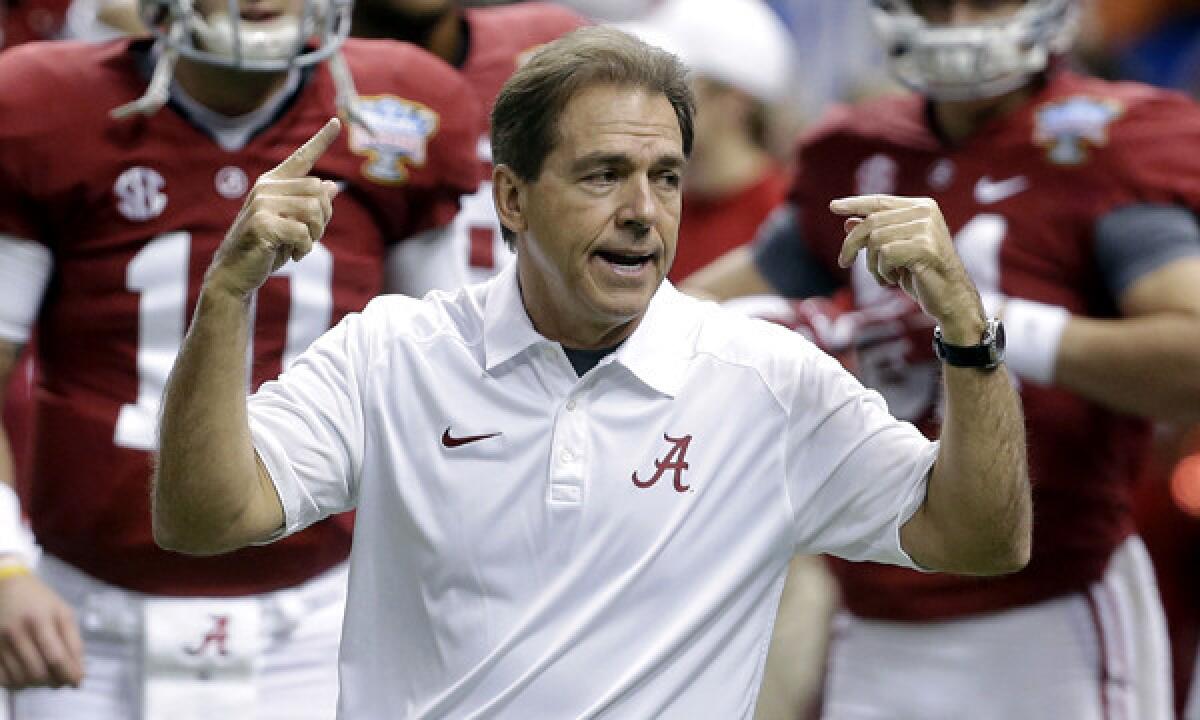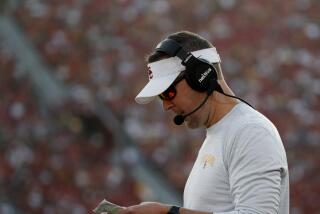College football coaches won’t give proposed new rule the time of day

Time appears to be running out on one of the most controversial issues of college football’s off-season.
The NCAA Football Rules Committee last month began considering a proposal that would penalize teams for snapping the ball before 10 seconds have elapsed on the 40-second play clock. The proposed rule, which would allow for defensive substitutions, would not affect the last two minutes of each half.
The proposal, initially trumpeted as a safety issue to protect players from injury, caught most college football coaches off guard. It also sparked and spotlighted a visceral divide between coaches who run up-tempo, no-huddle offenses and those such as Alabama’s Nick Saban who have made no secret of their desire to see the college game slowed down.
The ensuing debate over whether the proposal was driven by safety or strategy concerns has included elements of comedy, tragedy and major backpedaling.
The issue will come to a head, or wither, this week. The period for coaches to comment on the proposal ends Monday. The rules committee is scheduled to review, and perhaps amend or withdraw it before the NCAA’s Playing Rules Oversight panel is scheduled to vote on the issue Wednesday.
It is not expected to pass if it reaches the oversight panel, which includes Pac-12 Commissioner Larry Scott.
“The genesis of the rule is player safety,” said USC Coach Steve Sarkisian, who runs an up-tempo offense and is against the proposed change. “The reality of it is that there really is no data that supports that.”
The proposal, UCLA Coach Jim Mora said, “makes no sense to me. I’m all for player safety, but let’s get real. There are a lot of other ways to make player safety more of a priority.”
South Carolina Coach Steve Spurrier told USA Today that he called the proposal the “Saban Rule” and that he was against it.
Clearly, he’s not alone.
ESPN.com reported last week that, based on an anonymous survey, only 25 of 128 coaches at Football Bowl Subdivision schools were in favor of the proposal.
“The whole thing in just nuts,” said Washington State Coach Mike Leach, who runs an up-tempo offense. “This is a bureaucracy within a bureaucracy where the agenda is obvious.
“I think the motivation is guys don’t want to deal with spread offenses that hurry up. They are looking for ways to outlaw that.”
The controversy over the proposal began almost immediately after it was discussed by the football rules committee during a Feb. 11-12 meeting in Indianapolis.
“This rules change is being made to enhance student-athlete safety by guaranteeing a small window for both teams to substitute,” Air Force Coach Troy Calhoun, the chairman of the committee, said in a statement after the proposal was made public. “As the average number of plays per game has increased, this issue has been discussed with greater frequency by the committee in recent years and we felt like it was time to act in the interests of protecting our student-athletes.”
When coaches learned that Saban and Arkansas Coach Bret Bielema, who run slower-paced offenses, lobbied the committee, the reaction was immediate.
“None of the coaches I’ve talked to knew about the new rule proposal regarding waiting ten seconds to snap the ball — wondering#HiddenAgenda?” Arizona Coach Rich Rodriguez wrote on his Twitter feed.
Oklahoma State Coach Mike Gundy also took to Twitter. “The 10-second rule is like asking basketball to take away the shot clock — Boring! It’s like asking a blitzing linebacker to raise his hand,” he wrote.
Calhoun soon backtracked, saying during a conference call with reporters that unless “resounding” data regarding an increased incidence of injuries could be presented, “it makes no sense to push a rule forward.”
On Feb. 20, Bielema stoked the controversy by referencing the death of California defensive lineman Ted Agu, who collapsed and died after a conditioning drill on Feb. 7. The cause of Agu’s death has not been determined.
Cal Athletic Director Sandy Barbour responded the next day in a series of tweets. “Bret Bielema’s comments about our Ted Agu are misinformed, ill-advised and beyond insensitive,” Barbour wrote. She also tweeted, “Using the tragic loss of one of our student athletes as a platform to further a personal agenda in a public setting is beyond inappropriate.”
Bielema then issued an apology through Arkansas.
On Friday, in his first public comments about the proposal, Saban told al.com, “I had nothing to do with the idea of a 10-second rule” and that “player safety is the No. 1 thing, and that was my No. 1 issue as well.”
Saban cited safety issues caused by an increased number of plays.
“I don’t know that there’s any particular scientific evidence that you could say, more guys get hurt in this offense versus that one, or hurry-up, or whatever,” Saban told the website, adding that the NCAA does limit “exposures” players can be subjected to during spring practice, training camp and practices during the season.
He also expressed concern about officials’ ability to be in proper position and “competitive imbalance created by the pace of play.”
“If you ask the guys philosophically, a lot of them that run the offense, they say we want to wear the defense down and get the defense tired,” he said. “Well, you get the defensive players tired, they are going to be more susceptible to getting injured.”
Saban then acknowledged there was “no scientific data to prove this.”
In 2014, NCAA rule changes can be implemented only if they concern player safety or are “modifications that enhance the intent of a previous rules change.” Auburn Coach Gus Malzahn, who used a hurry-up offense and advanced to last season’s Bowl Championship Series title game, told reporters that there was “zero documented evidence” that pace of play causes more injuries and that he has asked Calhoun to allow for more discussion and move the issue to 2015, which is designated a rule-change year.
Leach said college football needs “less rules” and that “everybody has to have the opportunity to be heard.”
“We need succinct rules that are in the spirit of the game,” he said. “I certainly don’t think there should be tinkering artificially hiding behind player safety.”
Twitter: @latimesklein
Twitter: @cfosterlatimes
More to Read
Go beyond the scoreboard
Get the latest on L.A.'s teams in the daily Sports Report newsletter.
You may occasionally receive promotional content from the Los Angeles Times.












